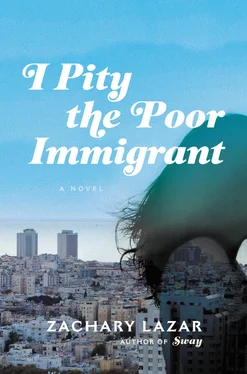The State of Israel in its twenty-four years had taken in hundreds of thousands of Jewish victims in the service of ending forever the saga of Jewish victimhood. He had ended his own victimhood a long time ago, before Israel existed. There were Israelis, many of whom had fought in wars, who believed that the end justified the means. There were others, many of whom had fought in wars, who believed otherwise.
He had attracted a large following now. The cameras would be there waiting for the next recess, Lansky out smoking in the courtyard with its scraggly palm trees, surrounded by young men who had come to see him. He would sit on a bench or on the steps and look at the restaurant sign across the street with its two red Coca-Cola logos, and he could have been in Miami facing trial there.
Mr. Lansky, what is the Jewish Mafia?
Mr. Lansky, have you ever committed a violent crime?
Mr. Lansky, are you a religious Jew?
Mr. Lansky, who killed Bugsy Siegel?
He didn’t answer — sometimes he made a joke. After five days, the hearings were over. Fate, luck, whatever. Whatever happened was out of his hands.

Gila wondered sometimes if she wanted him to be worse than he was. As if to be worse was also to be stronger, and somehow by association for her to be stronger.
She had brought her sketches to show a man named Gelb — he mostly did swimwear — and he muttered about which factories could make the stitch, private labels, things she already knew, industry talk. He had some acquaintance on Seventh Avenue who did knockoffs of big couture lines, maybe he could put her in touch. The offer was not so much mechanical as scornful. Swimwear, when she designed women’s clothes. Seventh Avenue, when she was in Tel Aviv.
Her mother napped in the reclining chair, hands like wax, her head covered by a bright orange scarf like some Orthodox housewife. If you had the choice between illness and death, you chose illness. Radiation and chemo, hope and despair. Her mother was younger than Meyer.
She watched him on TV. He looked terrible, weak, except for his eyes, standing in a slouch outside the Palace of Justice, cigarette in hand. Just from looking at him you could tell he had lost the case — he would have to leave Israel now. When he spoke, he reminded people that only a week ago, in Munich, terrorists had kidnapped and murdered eleven athletes from Israel’s Olympic team. He spoke of it in a strangely poetic way. Young branches cut down, were the words he chose. Young branches: by comparison his loss meant very little. He was an old man with a weak chin and a sunken mouth. She tried to see him that way.

He stared at the Old City of Jerusalem from a window of the King David Hotel. It would be a maze of narrow alleys this late at night — Armenian restaurants, souks, cracked buildings where everyone lived in a different century. From his room he could see the crenellated wall lit up like a theme park, the Tower of David with its parapets and flag. Egypt would come from the west, Syria from the north — everyone knew it was just a matter of time. You waited for the city to explode, but it didn’t. It glowed like something in a nightmare.

They ate in a café up the beach from the Dan Hotel, rows of tables and wicker chairs, oil lamps in glass boxes. Hummus, olives, tabouleh, labneh, baba ghanoush. The moon shone on the water. It was still a shock to have people’s eyes on her when she was with him. She tilted her head back to sip the cold beer from the large glass. He was watching her eat, sitting back a little from the table, smoking.
“I remember when you first came into the lobby,” she said. “People talked about you already. Who is he, he’s someone famous. You would just sit by yourself, drinking coffee, very quiet. Very calm.”
“No one special.”
“Like you owned the world.”
He bowed his head, turning the cigarette slowly in his fingers. “We could go to Caesarea for a couple days. Or maybe just stay here, relax.”
“I like Caesarea.”
She smiled down at her food, but the quiet way she said it was a way of saying no. They never spoke about her mother or her illness. She wondered how he was able to come and go so easily when he lived with his wife.
The room was blue in the dark and he lay on his back with his fists against his temples, waiting for it to pass. There were times when he couldn’t do much of anything and it made him pound the bed in anger and shame. It was their last time together. He let his hand rest on her thigh and she held it there.
“I’m going to make a Pernod,” she said. “Would you like one too?”
“Yes, fine.”
“Just one ice cube to make it turn milky.”
They sipped their drinks and didn’t speak. Afterward, he lay with his head on her bare stomach. He was clean and he smelled like cologne, and he moved himself up and they stayed that way for a long time. She had to concentrate — he was concentrating too — they went slowly. His body was not unpleasant. It was a yearning body, and she held him closely in her arms.
They slept late the next morning and then they said goodbye.

She was a cocktail waitress. Businessmen, scotch and gin, some stale pastries in a glass case, no music in the background. One night, after Meyer had left Israel, the journalist Uri Dan came in with a group from the embassies, and he half stood and pointed at each of them with his cigarette, relaying their orders, not seeing her. Of course, he could not have known who she was. Of course, she was nobody. She bent at the knees, serving, back straight, focused on the glasses, the table. The inventedness of Israel as a country seemed completely transparent at such moments, everything too new to be convincing, but she realized that this was a refugee’s thinking. The real problem was that she had never gotten used to the newness, had never taken her position in the country seriously enough.
She was smoking at the bar in her uniform one day when Meyer’s driver walked into the lobby in his jeans and sunglasses. He had come to check on her and also to give her something — he would explain it to her in the car if she had a few minutes to go for a drive. She remembered him, they had met a few times before.
They left the hotel driveway and started up Frishman Street, past Ben Yehuda, Dizengoff, the sudden open space of Kings of Israel Square — pigeons and litter, discount stores fronted by cafés with white tables. They kept east until it got quieter, a neighborhood of modern apartment buildings, flowering trees, benches in the shade. The lantana grew in hedges, its pink and orange petals dusting the sidewalks like scraps of bright plastic.
“This is where he lived,” the driver said. “Here and in Ramat Gan. He lived in a lot of places.”
She stared at his turned face.
“He said the rent would be taken care of. I told him I would take you here and give you the keys. You can do whatever you want after that.”
She sat there looking at it through the window, the narrow walkway up to the glass door beside the post boxes. It was a gray building like a thousand others in Tel Aviv, built on concrete stilts so cars could be parked beneath it. Inside, there was a tiny elevator with a brass gate that you had to pull back by hand before the door would close. There was barely enough room for the two of them. On the third floor, they exited into a dim hallway with a linoleum floor, mezuzahs on the identical doorframes, a smell of cabbage. It was smaller than her own hallway. It looked like a place to die.
Читать дальше













